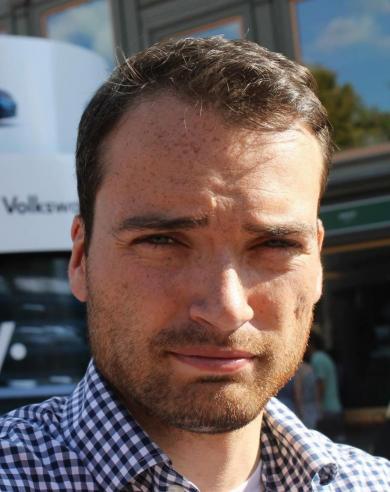Leader Spotlight: Michael Trudeau
As part of United Religions Initiative North America’s #TangibleHope campaign, Veterans for American Ideals is recognizing veteran leaders who are continuing their service by building unity and standing up for American values. Through a series of interviews, we’re asking VFAI leaders to share more about how their service shaped them and what responsibility they feel veterans have to speak up on issues that relate to our national ideals.
Today’s interview is with Michael Trudeau, a U.S. Navy veteran and MBA student at Northeastern University.
1. Tell me about your military service.
I served in the U.S. Navy’s submarine force from 2004 to 2009 as a sonarman. I was stationed in Connecticut, Washington, and Pearl Harbor, with one deployment to the Western Pacific.
I joined because of the events of September 11th. I was a young man at the time, with no real plans to go to college, but I felt I needed to do something for my community and for my country. I thought that the military might be the best thing for me to do.
I didn’t know at the time how far the global war on terror would extend or how it would develop, but I joined the Navy because I had done some technical stuff in high school, and at 120 lbs I knew the Marines likely weren’t for me.
2. How did your service shape the person you are today?
Serving on a submarine, you quickly become aware of your own personal space, as well as the personal space of your crewmates, and you must develop a real sense of empathy. If you’re self-centered and only thinking about yourself, then you’re not going to succeed in that environment.
In addition to tangible skills like time and stress management, the greatest gain from time in the military was the growth of my own empathy toward others. I carry that into much of the work I’m now doing with Vets for American Ideals.
3. As a veteran, what sort of responsibility do you feel to speak up on issues that relate to American ideals?
America is all about creating a space for yourself: you can be anyone you want to be in America, and you should be able to make a living doing so. American ideals are therefore about creating an equitable society for everyone. It’s not about giving one set of rights to one set of people; it’s about making sure that everyone has an equal shot at becoming the best that they can be.
As a veteran, I have a responsibility to defend those that don’t have the common equity that they deserve. I swore to defend the Constitution and that’s what the Constitution is: a contract at birth with us all to ensue we all can reach our highest potentials and be protected while doing so. Ensuring a common dignity for all people is part of the oath I took. I’m just keeping the promise.
4. Tell me about one issue related to those ideals that is of particular importance or concern to you right now. What are you doing about it?
One issue that really strikes a chord with me is the refugee crisis. It’s the largest since World War II. The horrors that those individuals go through and the way that we turn our back on them is a travesty.
It often doesn’t feel like I’m doing enough, but I do talk with people about the issue a lot, and I engage in advocacy. A few weeks ago I was in DC with other leaders from Vets for American Ideals to advocate for more funding and support for refugees.
The main reason I wanted to be part of that effort isn’t because I’m a veteran, but because I’m a dad. Every time I see a photo of a kid washed up on a beach in Greece or in the back of an ambulance in Syria, I think about my own kid. If I were in that situation, I wouldn’t want people turn their backs on me and my family. America shouldn’t be turning its back to this.
5. What would you say to other veterans about the role that they can play in these issues as citizens?
First, you have an obligation. As a vet you have given an oath to defend the Constitution, and the dignity of all people. That oath continues even after you take off the uniform.
Second, if you care about something, never stop fighting for it. There will be tough battles and there will be losses, but never give up. Keep pushing, and keep the common dignity of all in mind in everything that you do.


